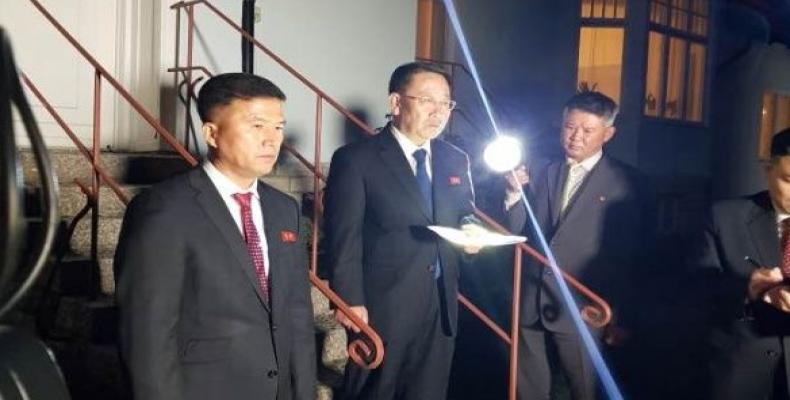Stockholm, October 5 (RHC)-- North Korea’s top negotiator said late on Saturday that working-level nuclear talks in Sweden between officials from Pyongyang and Washington had broken off, dashing prospects for an end to months of stalemate.
The North’s chief nuclear negotiator, Kim Myong Gil, who spent much of the day in talks with an American delegation, cast the blame on what he portrayed as U.S. inflexibility, saying the other side’s negotiators would not “give up their old viewpoint and attitude.”
“The negotiations have not fulfilled our expectation and finally broke off,” Kim told reporters outside the North Korean embassy, speaking through an interpreter.
The U.S. State Department said those comments did not reflect “the content or spirit” of more than 8-1/2 hours of talks, and Washington had accepted Sweden’s invitation to return to Sweden for more discussions with Pyongyang in two weeks.
“The U.S. brought creative ideas and had good discussions with its DPRK counterparts,” spokeswoman Morgan Ortagus said in a statement. North Korea is also known as the Democratic People’s Republic of Korea (DPRK).
She said the U.S. delegation had previewed a number of new initiatives that would pave the way for progress in the talks, and underscored the importance of more intensive engagement to solve the many issues dividing both sides.
“The United States and the DPRK will not overcome a legacy of 70 years of war and hostility on the Korean Peninsula through the course of a single Saturday. These are weighty issues, and they require a strong commitment by both countries. The United States has that commitment,” she said.
North Korea’s Kim downplayed the U.S. gestures.
“The U.S. raised expectations by offering suggestions like a flexible approach, new method and creative solutions, but they have disappointed us greatly and dampened our enthusiasm for negotiation by bringing nothing to the negotiation table,” he said.
Swedish broadcaster TV4 reported that the U.S. Special Representative for North Korea, Stephen Biegun, who led the U.S. team, had arrived back at the country’s embassy in central Stockholm.
The Swedish foreign office declined to give any details on the invitation for new talks, or whether Pyongyang had accepted.
The meeting at an isolated conference center on the outskirts of Stockholm was the first formal working-level discussion since U.S. President Donald Trump and North Korean leader Kim Jong Un met in June and agreed to restart negotiations that stalled after a failed summit in Vietnam in February.
Since June, U.S. officials had struggled to persuade North Korea to return to the table, but that appeared to change this week when North Korea abruptly announced it had agreed to hold talks.
On Saturday evening, negotiator Kim Myong Gil accused the United States of having no intention of solving the countries’ difficulties through dialogue, but said a complete denuclearization of the Korean Peninsula was still possible.
He said it would only happen “when all the obstacles that threaten our safety and check our development are removed completely without a shadow of a doubt,” an apparent reference to North Korea’s desire to see Washington ease economic pressure on it.


